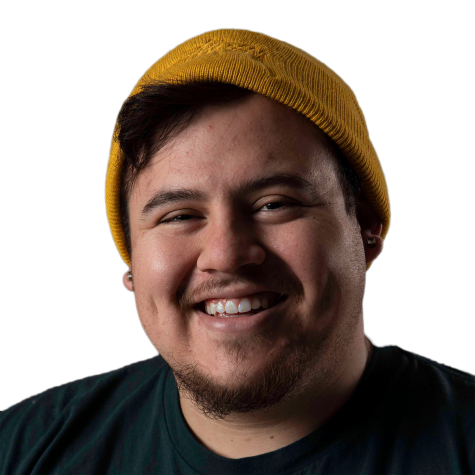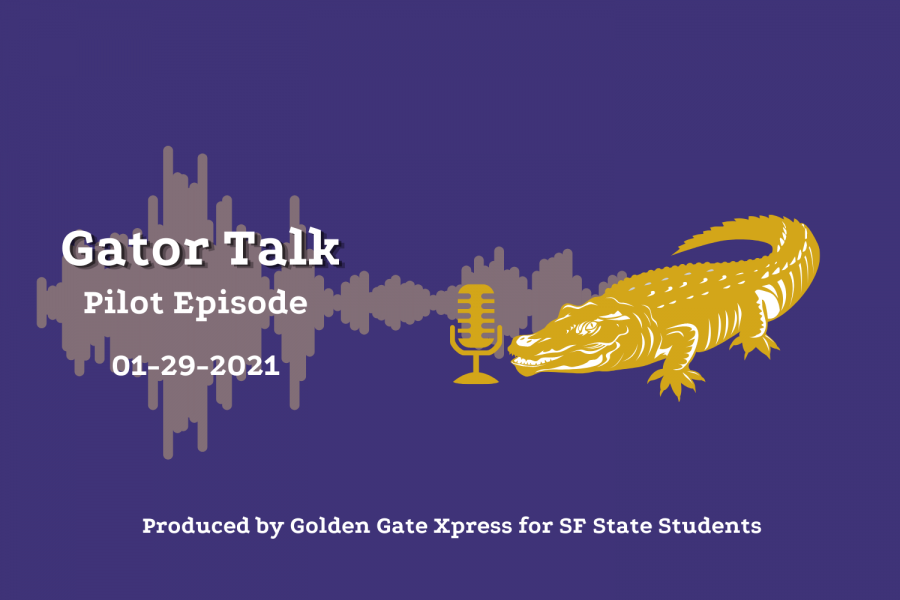
Gator Talk Episode 1: Pilot
January 29, 2021
Welcome to Gator Talk, a collaborative CalState podcast that brings city and statewide perspectives to SF State news.
Sheba Piano Lounge is one of the latest establishments in the city of San Francisco struggling to survive during the COVID-19 pandemic, it is one of the last jazz clubs in the neighborhood.
In Gator Talk’s pilot episode, host Sebastian Mino-Bucheli talks with co-owner of the Sheba Piano Lounge, Netsanet Alemayehu, and founder of the Afro-Cuban Ensemble at SF State, Professor John Calloway, about the history of the Fillmore and how music venues are dealing with the pandemic.
TRANSCRIPT:
TRANSCRIPT:
*Salsa song fades in*
Sebastian Mino-Bucheli: This is Sebastian Mino-Bucheli. I’m your multimedia editor and your host for Gator Talk, a Golden Gate Xpress podcast that brings news to SF State students. For more information/coverage, check out goldengatexpress.org OR @GatorTalkPod on all social media platforms.
Mino-Bucheli: To those who have lost loved ones, to those who are currently unemployed and to those facing problems with housing, although resources may be available to you, I want you, the audience, to know that we at Golden Gate Express are here for you to in these times. We care very much.
Lastly for seniors, like myself, who will be starting their last semester at SF state and will be the last class to graduate virtually, you’ve did it, you have earned this. And with that let’s get on with the episode.
So the top news for January, President Biden and vice president Harris were sworn in this month. Within hours, President Biden signed numerous executive orders to undo President Trump’s policies. There is now a national mask mandate, but if you’ve been living in the San Francisco Bay Area, this isn’t new to us and as a reminder, SF State’s last virtual semester had started Jan. 25. Golden Gate Xpress First 100 project debuted. To check out our coverage at goldengatexpress.org.
I’m going to set the scene for the main story.
Before the pandemic. It was hard not to be hypnotized by the radiant, majestic, purple neon sign hanging outside of the Sheba Piano Lounge. A restaurant that is owned by two Ethiopian sisters who incorporated live jazz music through their restaurant to keep the legacy of the Fillmore neighborhood alive. As you enter the establishment, you’re greeted by the warm chords of a piano being played, the ratatat of a drum set, while saxophonist croons melodies back and forth. In unison, the band messes up the ability to blow you away. Your call back to reality is the crowd of people cheering along. During the whole commotion, you’re trying to find a spot in the lounge to order drinks or food amongst the sound of music.
The Sheba Piano Lounge is one of the latest establishments in the city of San Francisco struggling to survive during the COVID-19 pandemic. It is one of the last jazz clubs in the neighborhood.
Netsanet Alemayehu: Yeah, so, you know, we’ve been closed since March 16, so we’re still closed. But I mean, hopefully, almost from March to now, and hopefully, they will lift, you know the shelter and tell everybody, you know after the vaccine.
Mino-Bucheli: That was Netsanet Alemayehu. Her sister Israel Alemayehu are both co-owners of the Sheba Piano Lounge. Their establishment pairs Ethiopian food with live music. I used to cover the Fillmore neighborhood as my neighborhood beat when I took the GWAR Reporting course in the Journalism Department.
Alemayehu: When we go there to clean, twice a week, we see outside, people running, asking when we are going to open. They miss it, we miss them too. So hopefully that it’s affected us so much, you know, the rent is piling up and we took a loan now, a small business loan, and I don’t know how that is going to last because I don’t know how the business will be when we return to business. How it’s going to be because nobody knows it’s unpredictable, but we hope to go back and start a business again.
Mino-Bucheli: I wanted to dig deeper and find out about the history of the Fillmore. So I decided to call up as a state professor John Calloway. He teaches LTNS 425 popular and traditional music of the Latina/Latino diaspora. He is also the founder of The Afro-Cuban Ensemble on campus.
Prof. Calloway: In the 50s it would call the Harlem of the way, and the reason that was called out was after, okay, so the background is this. it was an African American film or it was the general area. And then with the incarceration of Japanese Americans to work through a lot of the African-American starts to lose it during and after World War II. It became called the Harlem of the West and Filmore Avenue used, Fillmore used to have a bunch of clubs there, and all the great Jazz musicians used to play there. So that’s how it became a hub in the fifties. It started to die out in the late 50s like in a lot of other places in the United States. In terms of mass popularity, they were still Jazz going in the sixties and seventies for sure, but it was like Fillmore was like Midtown Manhattan for jazz in the 1950s.
Mino-Bucheli: We’re going to take a quick break. To support the Golden Gate Xpress work by signing up for our online newsletter, following our Instagram or Twitter @GGXNews and visiting the website goldengatexpress.org. Interested in advertising with Golden Gate Xpress, check out our advertising page on goldengatexpress.org/advertising.
Mino-Bucheli: Before the pandemic even occurred, Black-owned businesses in the Fillmore had already been going through financial problems back in 2019 Isla Vida, an Afro-Caribbean restaurant in the city, owned by J. Foster closes doors less than a year after being opened.
Prof. Calloway: What happened was Urban revitalization pushed a lot of families out of the Fillmore and as a lot of places and you can typically pop this valve Americans. They’re mostly in the pin or were able to put in housing, housing units, public housing orange or low and moderate-income housing so they basically did the gentrification. The neighborhood and that is what’s happening for a while back. They did try to revitalize it in college as District as much as ten years ago. That would have been at least four colorful that block or Sheba is now there’s only a few of you know, it’s very difficult. It’s not an easy area to survive but we are lucky because we don’t or open almost 15 years now and because of the music we offer and on jazz is like and there’s no cover charge and then our parents keep our menu price down because of the location, you know gang and me and my sister over there seven days and seven nights a week because you know / to make your own business survive, you have to maintain it. He closed the door open. Well, what if you have resistance? And even the bookstores closed down so everything is a virtual concert and I can tell you the cats that were playing the few clubs that were around like, you know, what the club is fully invested in for injuries. When the Boom-Boom room. Yeah, I mean like that. I mean there I mean a lot of cats who once a month, you know, something of theirs nothing and people struggling they’re playing virtual concerts and puts that we’ll have them for very little money. Like everything else like the restaurant industry and being a restaurant worker being a live musician of these of anything. It’s a big struggle right now, you know, it’s really hard to keep the incentives to practice. I have not been a full-time musician. I’m still playing guys. Do I know that what you did for a living and teaching or strut really struggling you have no way of making income there’s no gigs and you know gigs would be a couple of those cakes a week, you know private corporate gig Maybe a wedding or restaurant Gig and they throw that together with teaching and they could reasonably, you know survive in the city, you know, it’s hard to set is there’s nothing that’s it was saying and I’m surprised that so many were still here trying to figure it out because there’s no money.
*Jazz song fades in*
Mino-Bucheli: Here’s a GoFundMe page for the Sheba Piano Lounge. It’s under GoFundMe/Shiba Jazz Lounge rescue fund.
Dear Sheba family,
We’ve been thinking of each and every one of you since the day we were forced to close our doors and we hope that you and your family are healthy and safe. We’re reaching out to you because we know that we are a part of the Sheba family. You want to know what’s been going on. The last few months. The good news is that we’re planning to open toward the end of June or the beginning of July 2020. Right. Now one of the biggest hurdles is to figure out how to be able to keep our entertainment and music program. As you know, for the last 14 years. We have prided ourselves on not charging our patrons to come and enjoy the music that we provide. However, with the economic climate is going to be difficult for us to continue to offer live music. At this point, we need the support of every one of you to help us keep up with its original intention to bring music back to the historic Fillmore Jazz Preservation District. Musicians are an integral part of the Sheba family. They are the pulse of the Fillmore and we want to make sure that not only do we get to enjoy their music, but they get a stay employed. Our intention is to keep with our tradition of not having a cover charge so this is where you come in. Based on the economic hardship and our annual approximate budget of 60,000 for music, we’ve concluded that by raising approximately $75,000 we will be able to re-emerge from the rubble that COVID-19 has left us in create our new norm and keep the music going at the Sheba and also sponsor music outside of on Fillmore. Without you we have we would never have lasted 14 years and we’re asking for your support to keep the music going. Please donate now and share this campaign via text, email, and social media with any and everyone at Venmo: @Shebajazz. Thank you for your loyalty and support and love for good music and good times. We hope to see you real soon.
Sheba Jazz and family.
*Salsa song fades in*
Mino-Bucheli: And that was the episode. This is Sebastian Mino-Bucheli. I’m your multimedia Editor and your
host for Gator Talk. New episodes will premiere Friday mornings so stay tuned. And with that,
I’m signing off.


